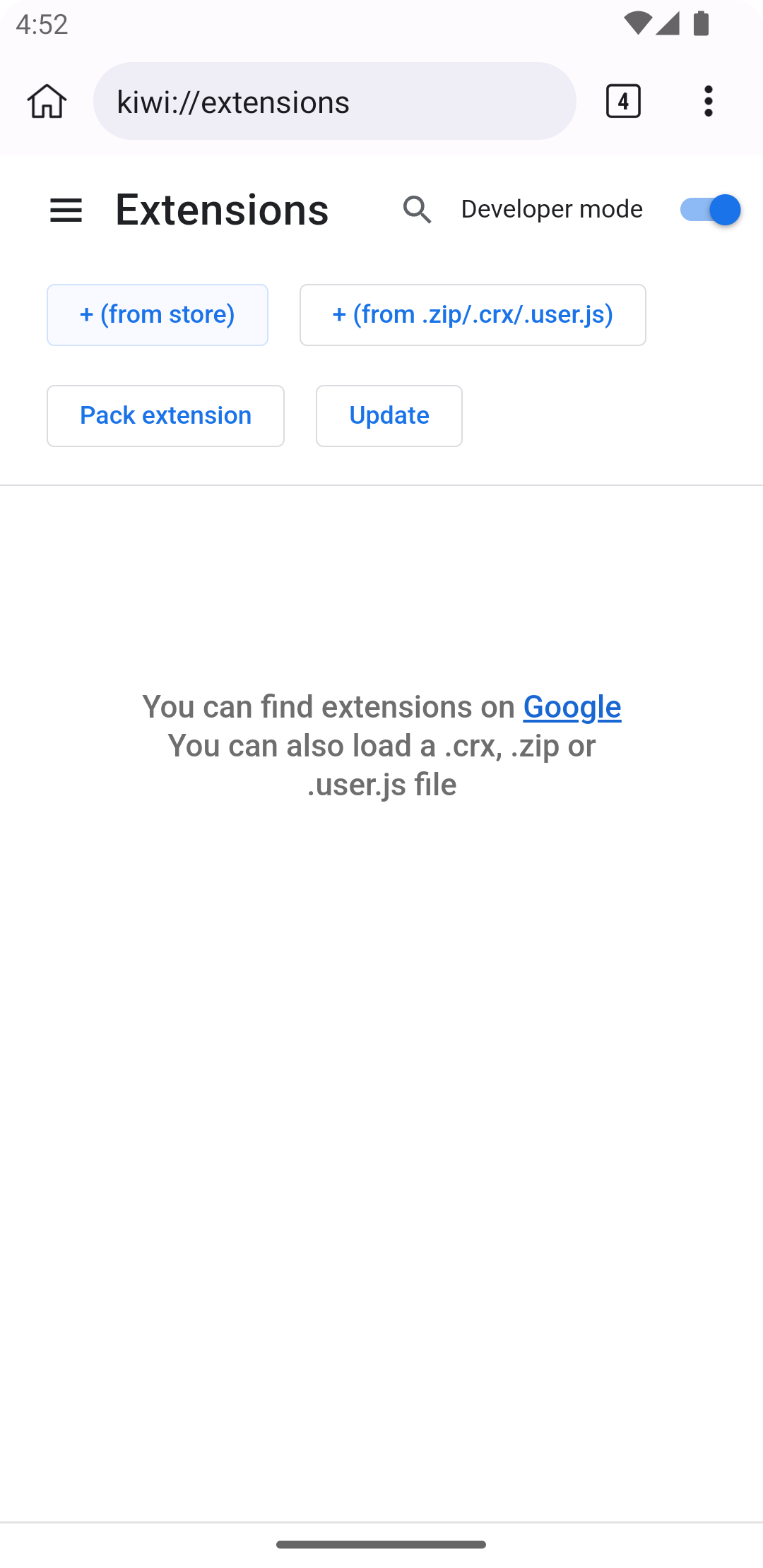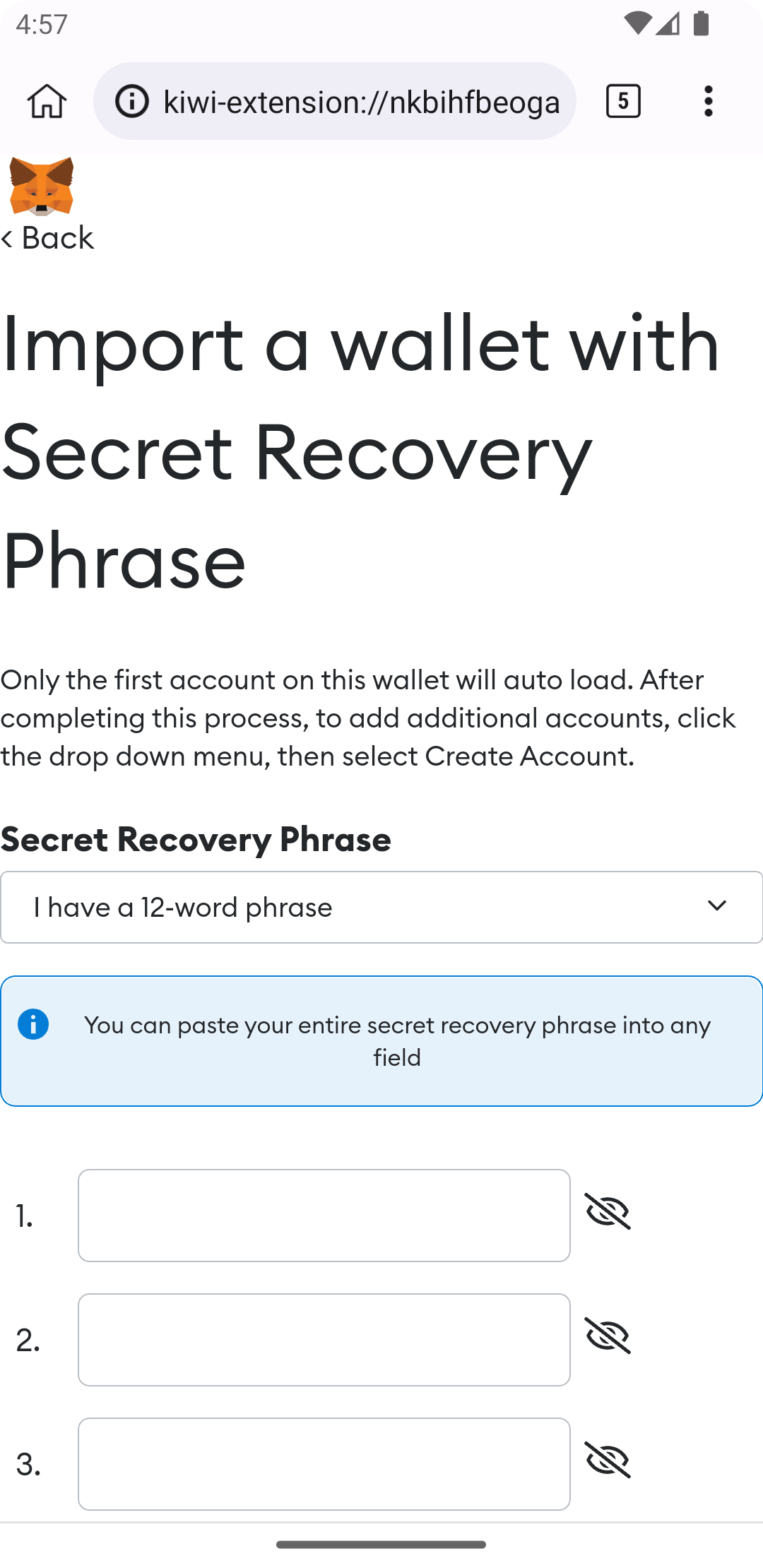Kiwi Browser is a open-source web browser for Android, based on "desktop" Chromium.
Kiwi Browser supports:
- Night Mode
- Support for all Chrome Extensions



- Bottom address bar
- Performance improvements like partial rasterization of tiles
You can get desktop-like experience using web3 wallet extensions, which is the focus here. We shall port/mirror to Gitea and Radicle sooner than later.
The browser is licensed under the same, very permissive, license as Chromium, you are free to fork and hack.
-
15 April 2018 - First Kiwi Browser release.
-
15 April 2019 - Kiwi Browser gets support for Chrome Extensions.
-
17 April 2020 - Kiwi Browser goes fully open-source.
-
12 Nov 2022 - EthBrno2 hackaton brings new wind for web3 and crypto-systems usage on mobile!
New builds are done from the original source to the Play Store.
There are thousands of hours of work in this repository and thousands of files changed.
Contributions are welcome and encouraged. For discussion, join https://matrix.to/#/#kiwibrowser-fans-building-it:matrix.org or post a new issue.
For your code to be integrated into KiwiBrowser open a PR and we either merge it or give feedback.
If you create your own browser or a mod, make sure to change the browser name and icon in chrome/android/java/res_chromium/values/channel_constants.xml and translation strings (search and replace Kiwi in all *.xtb, all *.grd and all *.grdp files).
When replacing the app icon, make sure to add the new icon files in their respective chrome/android/java/res/mipmap folders(mdpi, hdpi etc) and also update the AndroidManifest.xml.
The reference build machine is using Ubuntu 19.04 (also tested using Ubuntu 18.04 and Ubuntu 19.10).
The minimum system requirements are 2 vCPUs, 7.5 GB Memory.
You can use a virtual machine, an AWS VM, or a Google Cloud VM.
To put tools in your path run:
git clone https://chromium.googlesource.com/chromium/tools/depot_tools.git
then( assuming you have cloned that to your ~) add following to the end of your ~/.bashrc file
export PATH=$HOME/depot_tools:$PATHApply the change:
source ~/.bashrcThis will give you access to one utility called gclient (as in "Google client")
Create a directory called chromium, then:
cd chromium
git clone https://github.com/kiwibrowser/dependencies.git .cipd
cd .cipd
cp .gclient ..
cp .gclient_entries ..
git clone https://github.com/Huge/DesktopBrowserWithWeb3wallets.git srcAt this stage, in chromium you will have the .cipd folder, and a folder with the Kiwi Browser source code ./src.
To be able to build Kiwi Browser, you need python and OpenJDK (OpenJDK to create Java bindings for Android):
On MacOS:
brew install ncurses python
brew install --cask temurin ## on M1 you can skip this and look at the next step.Debian-based Linux( like Ubuntu):
sudo apt-get update
sudo apt-get install python openjdk-8-jdk-headless libncurses5We want to be sure to use Java 1.8 in to avoid compilation errors (lint and errorprone):
On M1(+) MacBooks:
brew tap homebrew/cask-versions
brew install --cask temurin8( See https://stackoverflow.com/questions/74008762/homebrew-error-openjdk8-no-bottle-available and https://www.yippeecode.com/topics/upgrade-to-openjdk-temurin-using-homebrew/ for more info. )
On Linux-like OSs:
sudo update-java-alternatives --set java-1.8.0-openjdk-amd64then run the following commands in chromium/src:
bash install-build-deps.sh --no-chromeos-fonts # Here you get forced to the Ubuntu eco real hard-(
build/linux/sysroot_scripts/install-sysroot.py --arch=i386
build/linux/sysroot_scripts/install-sysroot.py --arch=amd64These commands will install all necessary system packages using apt-get and gather a minimal build filesystem.
APKs (application packages) on Android need to be signed by developers in order to be distributed.
To generate a key:
keytool -genkey -v -keystore ~/chromium/keystore.jks -alias production -keyalg RSA -keysize 2048 -validity 10000 -storepass HERE_YOUR_ANDROID_KEYSTORE_PASSWORD -keypass HERE_YOUR_ANDROID_KEYSTORE_PASSWORDRun:
mkdir -p ~/chromium/src/out/android_armCreate a file called args.gn in ~/chromium/src/out/android_arm/ with this content:
target_os = "android"
target_cpu = "arm" # <---- can be arm, arm64, x86 or x64
is_debug = false
is_java_debug = false
android_channel = "stable"
is_official_build = true
is_component_build = false
is_chrome_branded = false
is_clang = true
symbol_level = 1
use_unofficial_version_number = false
android_default_version_code = "158"
android_keystore_name = "production"
android_keystore_password = "HERE_YOUR_ANDROID_KEYSTORE_PASSWORD"
android_keystore_path = "../../../keystore.jks"
android_default_version_name = "Quadea"
fieldtrial_testing_like_official_build = true
icu_use_data_file = false
enable_iterator_debugging = false
google_api_key = "KIWIBROWSER"
google_default_client_id = "42.apps.kiwibrowser.com"
google_default_client_secret = "KIWIBROWSER_NOT_SO_SECRET"
use_official_google_api_keys = true
ffmpeg_branding = "Chrome"
proprietary_codecs = true
enable_hevc_demuxing = true
enable_nacl = false
enable_wifi_display = false
enable_widevine = false
enable_google_now = true
enable_ac3_eac3_audio_demuxing = true
enable_iterator_debugging = false
enable_mse_mpeg2ts_stream_parser = true
enable_remoting = false
rtc_use_h264 = false
rtc_use_lto = false
use_openh264 = false
v8_use_external_startup_data = true
update_android_aar_prebuilts = true
use_thin_lto = true
enable_extensions = true
enable_plugins = trueYou can replace Android keystore password and Android keystore keypath with the data for your Android keystore (or you can generate a new key).
To prepare initial setup run from ~/chromium/src:
gclient runhooks
then generate the build files in ~/chromium/src:
gn gen out/android_arm
Alternatively you can use: gn args out/android_arm
To compile, use the command:
ninja -C out/android_arm chrome_public_apk
you'll have the output APK in ~/chromium/src/out/android_arm/apks/ChromePublic.apk
then you can run the APK on your phone.
You need to have the symbols for the version that crashed, the symbols can be generated using:
components/crash/content/tools/generate_breakpad_symbols.py --build-dir=out/lnx64 --symbols-dir=/tmp/my_symbols/ --binary=out/android_arm/lib.unstripped/libchrome.so --clear --verbose
If you have the crash information from logcat:
out/lnx64/microdump_stackwalk -s /tmp/dump.dmp /tmp/my_symbols/
If you have the crash information in a tombstone:
./third_party/android_ndk/ndk-stack -sym out/android_x86/lib.unstripped -dump tombstone
You can use Google Chrome to debug using the devtools console.
In case the devtools console doesn't work (error 404), the solution is to use chrome://inspect (Inspect fallback) or change SHA1 in build/util/LASTCHANGE
LASTCHANGE=8920e690dd011895672947112477d10d5c8afb09-refs/branch-heads/3497@{#948}
and confirm the change using:
rm out/android_arm/gen/components/version_info/version_info_values.h out/android_x86/gen/components/version_info/version_info_values.h out/android_arm/gen/build/util/webkit_version.h out/android_x86/gen/build/util/webkit_version.h out/android_arm/gen/chrome/common/chrome_version.h out/android_x86/gen/chrome/common/chrome_version.h
If you want to optimize of the final APK, you can look at the size of each individual component using command:
./tools/binary_size/supersize archive chrome.size --apk-file out/android_arm/apks/ChromePublic.apk -v
./tools/binary_size/supersize html_report chrome.size --report-dir size-report -v
The browser is getting paid by search engines for every search done using Kiwi Browser.
Depending on the search engine choice, requests may go via Kiwibrowser / Kiwisearchservices servers. This is for invoicing our search partners and provide alternative search results (e.g. bangs aka "shortcuts").
In some countries, the browser displays sponsored tiles or news on the homepage.
User data (browsing, navigation, passwords, accounts) is not collected because we have no interest to know what you do in the browser. Our main goal is to convince you to use a search engine partner, and this search engine makes money / new partnerships and shares revenue with us.
TBD, see the "focus" above for broad idea.
- Perhaps would be good to have tests to run in parallel comparing desktop Chromium behaviour with our mobile app's.
- Make/build a Docker image for building the
.apk, add instruction for using it here